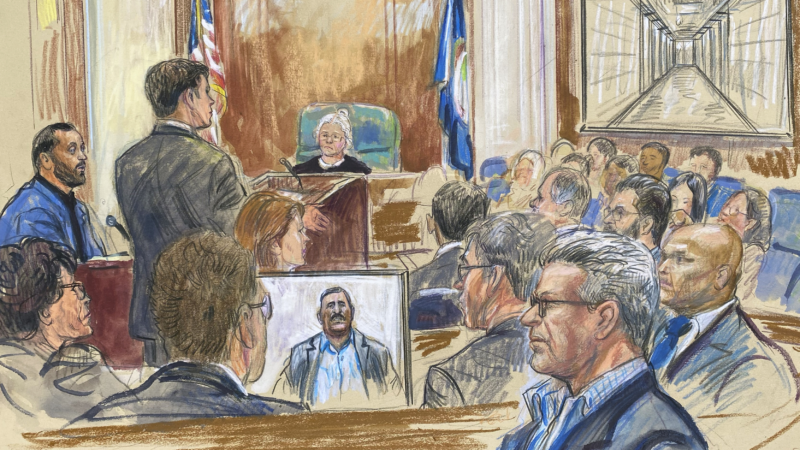A U.S. jury awards former Iraqi detainees $42 million for Abu Ghraib prison abuse
ALEXANDRIA, Va. — A U.S. jury on Tuesday awarded $42 million to three former detainees of Iraq’s notorious Abu Ghraib prison, holding a Virginia-based military contractor responsible for contributing to their torture and mistreatment two decades ago.
The decision from the eight-person jury came after a different jury earlier this year couldn’t agree on whether Reston, Virginia-based CACI should be held liable for the work of its civilian interrogators who worked alongside the U.S. Army at Abu Ghraib in 2003 and 2004.
The jury awarded plaintiffs Suhail Al Shimari, Salah Al-Ejaili and Asa’ad Al-Zubae $3 million each in compensatory damages and $11 million each in punitive damages.
The three testified that they were subjected to beatings, sexual abuse, forced nudity and other cruel treatment at the prison.
They did not allege that CACI’s interrogators explicitly inflicted the abuse themselves, but argued CACI was complicit because its interrogators conspired with military police to “soften up” detainees for questioning with harsh treatment.
CACI issued a statement expressing its disappointment in the verdict and its intention to appeal.
“For nearly two decades, CACI has been wrongly subjected to long-term, negative affiliation with the unfortunate and reckless actions of a group of military police at Abu Ghraib prison from 2003 through 2004,” the company said. “To be clear: no CACI employee has ever been charged — criminally, civilly, or administratively — in this matter. CACI employees did not take part in nor were any of our employees responsible for these disturbing events.”
Baher Azmy, a lawyer for the Center for Constitutional Rights, which filed the lawsuit on the plaintiffs’ behalf, called the verdict “an important measure of Justice and accountability” and praised the three plaintiffs for their resilience.
The $42 million fully matches the amount sought by the plaintiffs, Azmy said. It’s also more than the $31 million that the plaintiffs said CACI was paid to supply interrogators to Abu Ghraib.
“Today is a big day for me and for justice,” said Al-Ejaili, a journalist, in a written statement. “I’ve waited a long time for this day. This victory isn’t only for the three plaintiffs in this case against a corporation. This victory is a shining light for everyone who has been oppressed and a strong warning to any company or contractor practicing different forms of torture and abuse.”
Al-Ejaili traveled to the U.S. for both trials to testify in person. The other two plaintiffs testified by video from Iraq.
The trial and subsequent retrial were the first time a U.S. jury heard claims brought by Abu Ghraib survivors in the 20 years since photos of detainee mistreatment — accompanied by smiling U.S. soldiers inflicting the abuse — shocked the world during the U.S. occupation of Iraq.
None of the three plaintiffs were in any of the notorious photos shown in news reports around the world, but they described treatment very similar to what was depicted.
Al Shimari described sexual assaults and beatings during his two months at the prison. He also said he was electrically shocked and dragged around the prison by a rope tied around his neck. Al-Ejaili said he was subjected to stress positions that caused him to vomit black liquid. He was also deprived of sleep, forced to wear women’s underwear and threatened with dogs.
CACI had argued it wasn’t complicit in the detainees’ abuse. It said its employees had minimal interaction with the three plaintiffs in the case, and CACI questioned parts of the plaintiffs’ stories, saying that military records contradict some of their claims and suggesting they shaded their stories to support a case against the contractor. Fundamentally, though, CACI argued that any liability for their mistreatment belonged to the government.
As in the first trial, the jury struggled to decide whether CACI or the Army should be held responsible for any misconduct by CACI interrogators. The jury asked questions in its deliberations in both cases about whether the contractor or the Army bore liability.
In the first trial, which ended with a mistrial and hung jury, multiple jurors told The Associated Press that a majority wanted to hold CACI liable.
CACI, as one of its defenses, argued it shouldn’t be liable for any misdeeds by its employees if they were under the control and direction of the Army. under a legal principle known as the “borrowed servants” doctrine.
Lawyers for the plaintiffs argued that CACI was responsible for its own employees’ misdeeds. They said provisions in CACI’s contract with the Army, as well as the Army Field Manual, make clear that CACI is responsible for overseeing its own workers.
The lawsuit was first filed in 2008 but was delayed by 15 years of legal wrangling and multiple attempts by CACI to have the case dismissed.
Lawyers for the three plaintiffs argued that CACI was liable for their mistreatment even if they couldn’t prove that CACI’s interrogators were the ones who directly inflicted the abuse.
Evidence included reports from two retired Army generals, who documented the abuse and concluded that multiple CACI interrogators were complicit in the abuse.
Those reports concluded that one of the interrogators, Steven Stefanowicz, lied to investigators about his conduct and that he likely instructed soldiers to mistreat detainees and used dogs to intimidate detainees during interrogations.
Stefanowicz testified for CACI at trial through a recorded video deposition and denied mistreating detainees.
CACI introduced a different report that concluded contractors like CACI did a “satisfactory” job of complying with military procedures.
Party City files for bankruptcy and plans to shutter nationwide
Party City was once unmatched in its vast selection of affordable celebration goods. But over the years, competition stacked up at Walmart, Target, Spirit Halloween, and especially Amazon.
Sudan’s biggest refugee camp was already struck with famine. Now it’s being shelled
The siege, blamed on the Rapid Support Forces, has sparked a new humanitarian catastrophe and marks an alarming turning point in the Darfur region, already overrun by violence.
FDA approves weight loss drug Zepbound to treat obstructive sleep apnea
The FDA said studies have shown that by aiding weight loss, Zepbound improves sleep apnea symptoms in some patients.
Netflix is dreaming of a glitch-free Christmas with 2 major NFL games set
It comes weeks after Netflix's attempt to broadcast live boxing between Jake Paul and Mike Tyson was rife with technical glitches.
Opinion: The Pope wants priests to lighten up
A reflection on the comedy stylings of Pope Francis, who is telling priests to lighten up and not be so dour.
The FDA restricts a psychoactive mushroom used in some edibles
The Food and Drug Administration has told food manufacturers the psychoactive mushroom Amanita muscaria isn't authorized for food, including edibles, because it doesn't meet safety standards.







